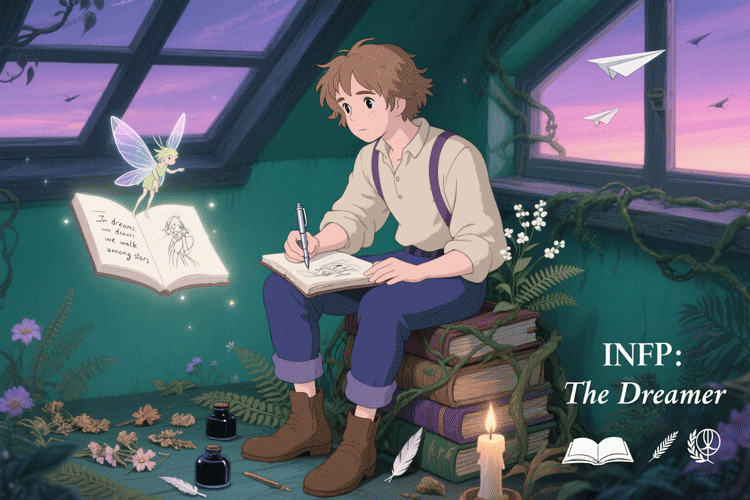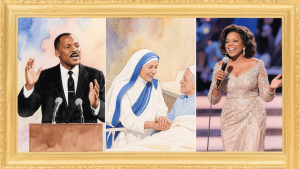INFP Personality Type – The Mediator
The INFP personality type, known as The Mediator in the 16 personalities framework, is deeply introspective, compassionate, and guided by strong inner values. These individuals are dreamers and idealists who believe in the power of kindness and authenticity. While they may seem quiet on the outside, their inner world is rich with imagination, emotions, and a strong desire to make the world a better place.
Core Traits of INFPs
INFPs are shaped by their dominant cognitive function — Introverted Feeling (Fi) — which drives them to make decisions based on deeply held personal values rather than external pressures. Supporting this is their Extraverted Intuition (Ne), which allows them to see endless possibilities and connections.
Key characteristics include:
-
Empathetic and compassionate – They naturally sense others’ emotions. -
Idealistic – Strive to align life with their personal principles. -
Creative problem solvers – Approach challenges with originality. -
Deep thinkers – Enjoy exploring philosophical and abstract concepts. -
Non-conformist – Resist following trends or societal expectations blindly. -
Private and reserved – Share their true selves only with trusted people. -
Flexible yet principled – Open to new ideas unless they clash with core values.
Strengths of INFPs
-
Deep empathy – Ability to connect with others’ emotional states. -
Creativity – Excel in art, writing, music, and unconventional thinking. -
Open-mindedness – Willing to consider diverse perspectives. -
Dedication to causes – Commit fully to meaningful work. -
Adaptability – Can adjust plans when necessary without losing purpose. -
Strong moral compass – Integrity guides their decisions.
Weaknesses of INFPs
-
Over-idealism – Can be disheartened when reality doesn’t match their vision. -
Conflict avoidance – May delay addressing important issues. -
Perfectionism – Sometimes hold back until conditions feel “just right.” -
Emotional sensitivity – Criticism can feel deeply personal. -
Difficulty with practical details – Focus on vision rather than execution. -
Overcommitment – May exhaust themselves helping others.
INFP in Love and Relationships
INFPs seek emotional depth and authenticity in relationships. They are not drawn to casual flings but to meaningful, lasting bonds.
Romantic strengths:
-
Loyal and faithful -
Supportive of their partner’s dreams -
Thoughtful and attentive -
Strive to understand rather than judge
Challenges:
-
May idealize partners, overlooking flaws -
Struggle to express dissatisfaction directly -
Require personal space to recharge
INFP in Friendships
As friends, INFPs are loyal, empathetic, and encouraging. They thrive in small circles where emotional safety is valued.
-
Prefer deep, one-on-one conversations over large gatherings -
Remember meaningful details about friends’ lives -
Offer heartfelt advice and genuine support -
Avoid drama and toxic dynamics
INFP in Family Life
In family settings, INFPs often play the role of peacemaker and emotional anchor.
-
As children: Sensitive and imaginative, often daydreaming -
As parents: Supportive, nurturing, and values-driven -
As siblings: Loyal and understanding, though may need solitude
Career Paths for INFPs
INFPs flourish in roles that align with their values and allow creative self-expression.
Ideal careers:
-
Creative arts – Writer, graphic designer, filmmaker, musician -
Helping professions – Counselor, therapist, social worker, teacher -
Humanitarian work – Non-profit coordinator, community organizer -
Research and academia – Anthropologist, historian, psychologist
Thriving in the workplace:
-
Work best in supportive, collaborative environments -
Need space for independent thought -
Prefer mission-driven organizations
Careers to approach with caution:
-
Highly competitive sales roles -
Rigid corporate structures -
Positions with constant confrontation
Tips for INFP Growth
-
Set realistic milestones – Break big dreams into achievable steps. -
Practice direct communication – Address conflicts before they grow. -
Accept imperfection – Progress matters more than perfection. -
Strengthen organizational skills – Use tools and routines for balance. -
Seek constructive feedback – Treat criticism as a learning opportunity. -
Balance giving with self-care – Avoid burnout from over-helping.
Compatibility and Relationships
INFPs often connect best with types who appreciate emotional depth and share similar values, such as:
-
ENFJ – Inspires and supports growth -
INFJ – Offers mutual understanding -
ENFP – Brings energy and shared idealism -
ENTP – Stimulates new perspectives and adventures
Famous INFPs
-
J.R.R. Tolkien – Author of The Lord of the Rings -
Audrey Hepburn – Actress and humanitarian -
William Shakespeare – Playwright and poet -
Princess Diana – Philanthropist and royal figure
Final Thoughts on INFPs
INFPs are visionaries of compassion and authenticity. They may walk quietly through life, but their influence can be profound, inspiring others to be true to themselves and to imagine a better world.
Ready to discover your own MBTI personality type?
Take the Free MBTI Personality Test here and receive instant, accurate insights tailored to you.
The INFP personality type excels in careers that allow creativity, autonomy, and a sense of purpose. Popular INFP careers include writing, counseling, graphic design, social work, psychology, and nonprofit advocacy. These roles align with INFPs’ values, enabling them to express themselves authentically while helping others. An INFP career path is most fulfilling when it matches their personal beliefs and allows them to make a meaningful difference.
The main INFP characteristics include deep empathy, idealism, creativity, and strong values. INFPs are introspective and often guided by their moral compass rather than external expectations. They enjoy exploring ideas, emotions, and human experiences. The INFP meaning in the MBTI framework is “Introverted, Intuitive, Feeling, Perceiving,” reflecting a personality that is both thoughtful and adaptable, with a focus on authenticity.
Many famous figures share the INFP personality type, known for their artistic vision and emotional depth. Examples of INFP celebrities include J.K. Rowling, Timothée Chalamet, William Shakespeare, Johnny Depp, and Alicia Keys. These individuals embody INFP characteristics such as creativity, passion, and a desire to inspire others through art, storytelling, and humanitarian work.






